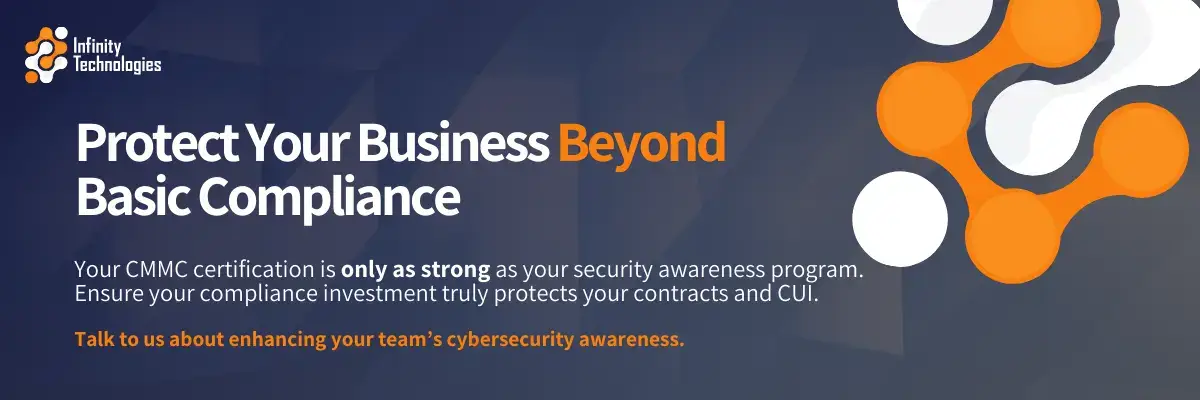The path to cyber resilience presents hurdle after hurdle for small businesses in Virginia’s defense industrial base (DIB). With limited resources and competing priorities, it’s tempting to view security awareness training as a simple box to check along the way, a necessary evil you must conquer to achieve CMMC Level 2 compliance that, once defeated, marks the end of your security journey. But this approach creates dangerous blind spots that leave contractors like you vulnerable – even when you’re technically “compliant.”
Why CMMC Level 2 Requirements Are Only The Starting Line
In truth, CMMC Level 2 sets a relatively low bar for security awareness training for small government contractors. Essentially, you need to:
- Provide general cybersecurity awareness training
- Deliver CUI-specific training based on job roles
- Document that training occurred
That’s it. The assessor asks, “Did you do it?” If you can prove you did, congratulations – you’ve passed that requirement.
But these bare-bones criteria don’t provide the comprehensive protection that government contractors need, especially those also subject to other regulatory frameworks like HIPAA.
Under the guise of being ‘compliant,’ it’s all too easy for those in the DIB industry to overestimate how secure they really are.
Overconfidence and Its Consequences
There’s a concerning disconnect between how confident many small government contractors feel about their cybersecurity posture and their actual security practices. The 2024 MXD report found that while 81% of defense contractors expressed high confidence in their security preparations, fewer than 50% were regularly implementing basic security controls.
This false sense of security leads to complacency, and complacency creates vulnerabilities that adversaries are eager to exploit. CMMC compliance for small contractors must be the foundation of your security strategy, not its ceiling.
When Good Employees Make Bad Security Decisions
Even well-intentioned staff can create significant gaps without proper security awareness training for small government contractors. Common mistakes include:
- Mishandling CUI by forwarding it to unauthorized recipients or saving it to personal devices
- Using unapproved technology (like phones on the NDAA Section 889 banned list)
- Failing to recognize increasingly sophisticated phishing or spoofed emails
One sensitive email sent to the wrong person from an unsecured personal account, and your business could be facing significant remediation costs – not to mention critical damage to your reputation (which can be much harder to rebuild than a bottom line). Goodbye, government contracts.
Aren’t Annual Training Rituals Enough?
You know the potential repercussions; you’ve heard the horror stories. So why does security awareness often get pushed to the back burner once assessment time is over?
For many small contractors, the journey begins with informal training – or none at all. The business operates on a “we sort of tell people” basis until CMMC compliance demands formal documentation.
Suddenly, they need written policies and logged evidence. They create these documents, hold a training session, collect signatures, and think, “Job done.” But formalizing training is just the beginning (not the end) of creating a secure environment.
While implementing formal training represents one of the highest-ROI steps in maturing your security posture, it won’t stop cybersecurity from slipping to the back of everyone’s minds after the assessment team leaves. That, my friends, relies on culture.
Cybersecurity Awareness Culture Bridges the Gap Between Policy and Practice
CMMC simply asks, “Did you do the training?” It’s a binary question for assessors. But real security awareness is about fundamentally changing behaviors and building a security-first culture throughout your organization.
You might have excellent policies on paper: no unauthorized USB devices, mandatory MFA, and password management protocols. Training plants the seed of awareness in your employees’ minds, but building a strong security culture is how those policies come to life for your users. Without firmly rooting them into people’s everyday workflows, those well-crafted policies remain just words in a document.
Government contractor cybersecurity best practices aren’t just about having rules. A bit like raising kids, they’re about ensuring your team understands the purpose of having those rules and that people follow those rules consistently. Cyber hygiene habits are learned – not assumed. And that learning requires consistent reinforcement.
Best Practices Beyond the Compliance Checkbox
To truly protect your business and the sensitive government data you handle, consider these enhancements to your security awareness program:
- Increase frequency: Run focused micro-training sessions quarterly rather than one annual marathon
- Personalize content: Develop role-specific modules for employees handling different types of CUI
- Extend to remote settings: Include secure device usage in work-from-home policies
- Create feedback loops: Offer anonymous reporting channels for security concerns
- Document diligently: Track training completion as evidence for future audits
- Seek specialized support: Work with IT support services in Charlottesville, Richmond, or Fredericksburg, VA, that have experience working with DIB businesses to improve cybersecurity
Changing how you think about (and interact with) security awareness training in this way shows clients, auditors, and other members of your supply chain that your business isn’t just compliant on paper; it’s mature, trustworthy, and highly responsible.
Creating a Security Culture That Stands the Test of Time
Achieving CMMC Level 2 compliance is great – in fact, it’s essential for many businesses we work with. But accomplishing a strong cybersecurity culture that actually keeps your business protected should be regarded with just as much importance. When security becomes part of your company’s DNA and best practices become second nature, your employees become your strongest defense; crucial links in your defensive chain that all work together to keep you safe from cyberattacks.
Whether you’re based in Charlottesville, Richmond, Fredericksburg, or elsewhere in Virginia, remember: CMMC compliance for small contractors should be viewed as the beginning of your security journey, not its destination.
The contractors who understand this distinction are doing so much more than checking boxes. They’re building businesses that are genuinely secure and fully prepared to face the evolving threats of tomorrow.



